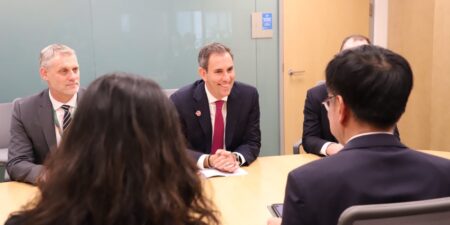
Australian Treasurer Visits Washington with an Eye on US Election

Insights & News


APEC 2024 in Peru: No Flash but Solid Progress
The BGA Indo-Pacific Team’s Senior Adviser Amb. Larry Greenwood wrote a client update on the …

Taiwan’s 2025 Defense Budget Will Increase, but Percent of Overall Spending Drops
The BGA Taiwan Team, led by Senior Adviser Rupert Hammond-Chambers, wrote a client update on …

Australian Treasurer Visits Washington with an Eye on US Election
The BGA Australia Team led by Managing Director Michael “Mick” McNeill, wrote an update to …
At BowerGroupAsia, we are committed to
delivering result-oriented solutions for our clients
We have proven track record of helping the world’s top companies seize opportunities and manage challenges across the dynamic Indo-Pacific region.




















